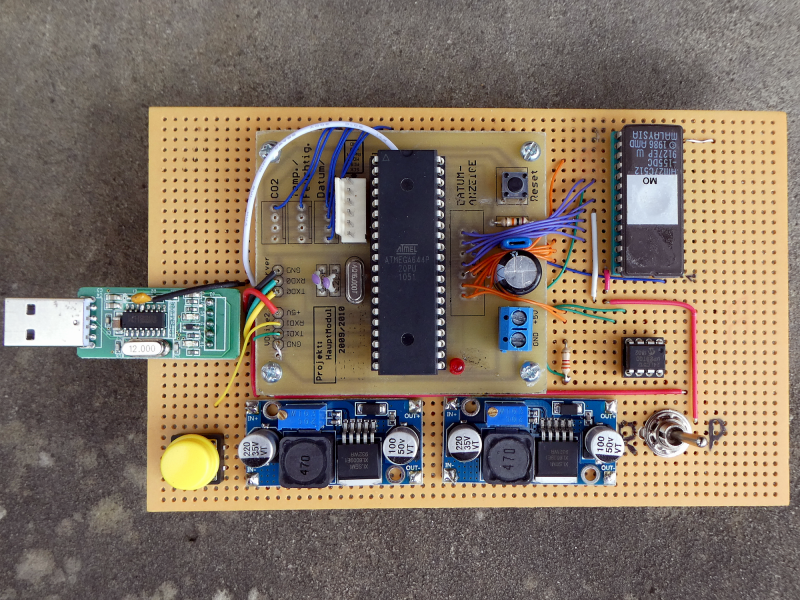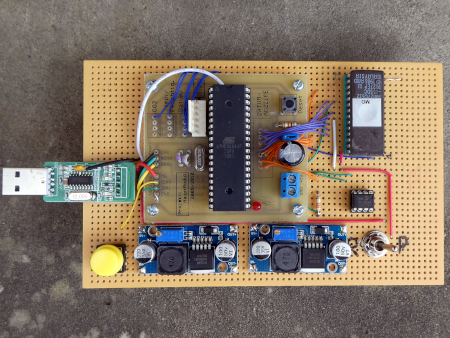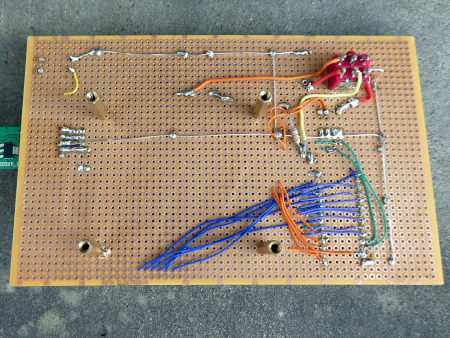Microcontroller projects
27C512 EPROM Programmer
last updated: 2023-03-30
Quick links

Intro
I would have liked to to name the project EPROM Master :). But that would have been a little exaggerated for this small project.
In a school project, the goal is to refurbish two old drink dispenser and bring these old devices up to date, and allow them to function for several more years.
As the firmware of one of the machines was outdated, we needed a copy of an EPROM 27C512, containing the firmware.
After looking at the data sheet, it was obvious that a simple and good solution would be an Arduino based programmer. Other old programmer need a PC with parallel port and old software. Much too complicated.
So I recycled an old ATmega644 project, "Arduinoized" it, added two DC-DC Boost converter and an I²C EEPROM, and ready was the EPROM Programmer.
No PC and no shift register are needed. When pressing the (yellow) button in READ mode the EPROM is read and written to the I²C EEPROM. After switching into PROGRAM mode and pressing the button the EPROM is programmed by copying the EEPROM content.
Hardware
I had a bunch of USB-Serial converter boards from SDS011 fine dust sensors. Fortunately they contain a CH340G chip, witch features DTR on pin 13. The DTR signal has to be connected to RESET through a capacitor (100 nF) to be able to program ATmega chip with Arduino. capacitor with RESET. RxD will be connected with TxD on the ATmega chip and TxD with RxD.
More infos about that: https://www.weigu.lu/microcontroller/avr_MICES2_2_arduino/index.html.
The two DC-DC Boost converter get 5 V at the input and are trimmed to 6.25 V resp. 12.75 V at the output. This tensions are needed to program the chip (datasheet 27C512).
BOM
| RESET | GPIO0 | |
|---|---|---|
| 2 | Push-Button | |
| 1 | Switch DPDT | |
| 1 | ATmega16, 32 or 644 | |
| 1 | crystal 16MHz | |
| 2 | capacitor 22pF | |
| 1 | capacitor 100nF | |
| 1 | resistance 3.3k | |
| 1 | resistance 6.8k | |
| 1 | resistance 10k | |
| 2 | DC-DC Boost Converter | |
| 1 | 24LC512 + socket | |
| 1 | USB-Serial converter | |
| 1 | IC socket 28 pol. |
The address lines are connected with PORTA and PORTB of the ATmega chip. I had problems to program the I²C chip through softwire, so needed to use the two LSB pins of PORTC for hardware I²C. The data port uses 6 pins of PORTC and two pins of PORTD.
Circuit


Software
First we flash the Arduino bootloader to our ATmega chip. We are lucky that MCUdude maintains the MightyCore for Arduino. You can find the software on https://github.com/mcudude/MightyCore. To install it in Arduino is not complicated:
- In
File→Preferencesadd the following URL inAdditional Boards Manager URLs:
https://mcudude.github.io/MightyCore/package_MCUdude_MightyCore_index.json
- Separate the URLs using a comma if you have more than one URL.
- Go to
Tools→Board→Boards Manager...and scroll down to MightyCore. - Click on
Installand restart Arduino.
To flash the bootloader, chose the right chip under Tools → Board. The clock is 16MHz external.
Under Tools → Programmer choose AVRISP mkII. Hold the shift key and click on Tools → Burn Bootloader.
MightyCore DIP40 Standard pinout
We select the standard layout in Arduino Tools (default), wich is quite straightforward. The digital pins are numbered from 0-31 beginning with portB (PB0) to portD to portC to portA (PA7).
A better image is found on https://github.com/mcudude/MightyCore.
Arduino Skech
/*
eprom_programmer_27c512_mega32
Atmega644p
---------------------------------------------------------------------------
Copyright (C) 2023 Guy WEILER www.weigu.lu
This program is free software: you can redistribute it and/or modify
it under the terms of the GNU General Public License as published by
the Free Software Foundation, either version 3 of the License, or
(at your option) any later version.
This program is distributed in the hope that it will be useful,
but WITHOUT ANY WARRANTY; without even the implied warranty of
MERCHANTABILITY or FITNESS FOR A PARTICULAR PURPOSE. See the
GNU General Public License for more details.
You should have received a copy of the GNU General Public License
along with this program. If not, see <https://www.gnu.org/licenses/>.
---------------------------------------------------------------------------
*/
//#define DEBUG
#include "extEEPROM.h" // Tools -> Manage Libraries... inst.
extEEPROM eep(kbits_512, 1, 128, 0x50); //create EEPROM object adr = 0x50
const unsigned long EPROM_SIZE_BYTE = 65536;
const unsigned int PAGE_LENGTH_BYTE = 128;
unsigned int NR_OF_PAGES = EPROM_SIZE_BYTE/PAGE_LENGTH_BYTE;
byte page_data[PAGE_LENGTH_BYTE];
const byte PIN_PUSHBUTTON = 10; // PD2
const byte PIN_GET_SWITCH = 11; // PD3
const byte PIN_EPROM_E = 14; // EPROM Enable PD6
const byte PIN_LED = 15; // PD7
byte eprom_data_byte = 0;
/****** SETUP ******/
void setup() {
Serial.begin(38400); // 38400 more accurate than 1115200!
while (!Serial);
#ifdef DEBUG
Serial.println("\nHello from your 27C512 Programmer");
#endif // DEBUG
eep.begin(eep.twiClock400kHz); // init I2C bus (use 400kHz)
// Address ports 16 bit (PortA and PortB)
DDRA = 0xFF; // adressing with PortA and B (OUTPUT)
DDRB = 0xFF;
pinMode(PIN_PUSHBUTTON, INPUT_PULLUP);
pinMode(PIN_GET_SWITCH, INPUT);
pinMode(PIN_EPROM_E, OUTPUT);
pinMode(PIN_LED, OUTPUT);
digitalWrite(PIN_EPROM_E,HIGH); // disable Eprom
digitalWrite(PIN_LED,HIGH); // switch LED off (neg. logic)
}
/****** MAINLOOP ******/
void loop() {
if (!digitalRead(PIN_PUSHBUTTON)) { // if yellow button pressed
#ifdef DEBUG
Serial.print("Bushbutton pressed: ");
#endif // DEBUG
if (digitalRead(PIN_GET_SWITCH)) {
#ifdef DEBUG
Serial.print("Programming Mode"); // Programming Mode
#endif // DEBUG
write_eprom_from_eeprom();
}
else {
#ifdef DEBUG
Serial.print("Reading Mode"); // Reading Mode
#endif // DEBUG
//choose one of the following:
//read_eprom_2_serial_bytestream();
//copy_eprom_2_eeprom_and_serial_output();
copy_eprom_2_eeprom();
//read_eeprom_2_serial_bytestream();
//compare_eprom_2_eeprom();
//read_eprom_2_serial_ascii_cooked();
//read_eprom_2_serial_ascii();
}
}
delay(300);
}
/****** EPROM and EEPROM Functions ******/
void eprom_set_address(unsigned int adr) {
PORTA = lowByte(adr);
PORTB = highByte(adr);
delayMicroseconds(1);
}
void data_port_input() {
// Data port 8 bit (6 bit on PortC and 2 bit on PortD)
DDRC = DDRC & 0x03; // PortC (without SCL/SDA PC0,PC1)
DDRD = DDRD & 0xCF; // 2 datalines on PortD (PD4 and PD5)
delayMicroseconds(1);
}
void data_port_output() {
// Data port 8 bit (6 bit on PortC and 2 bit on PortD)
DDRC = DDRC | 0xFC; // PortC (without SCL/SDA PC0,PC1)
DDRD = DDRD | 0x30; // 2 datalines on PortD (PD4 and PD5)
delayMicroseconds(1);
}
void read_eprom_setup() {
digitalWrite(PIN_LED,LOW); // switch LED on
digitalWrite(PIN_EPROM_E,LOW); // enable EPROM
data_port_input();
#ifdef DEBUG
Serial.print("Reading Eprom... ");
#endif // DEBUG
}
void read_eprom_setdown() {
digitalWrite(PIN_EPROM_E,HIGH); // disable EPROM
#ifdef DEBUG
Serial.println("done");
#endif // DEBUG
digitalWrite(PIN_LED,HIGH); // switch LED off
}
void read_eprom_2_serial_bytestream() {
read_eprom_setup();
for (unsigned long adr = 0 ; adr < EPROM_SIZE_BYTE; adr++) {
eprom_set_address(adr);
eprom_data_byte = (PINC & 0xFC) | ((PIND & 0x30)>>4);
Serial.write(eprom_data_byte);
}
read_eprom_setdown();
}
void copy_eprom_2_eeprom() {
unsigned long adr = 0;
read_eprom_setup();
for (unsigned int page = 0; page < NR_OF_PAGES; page++) {
for (unsigned int byte_in_page = 0; byte_in_page < PAGE_LENGTH_BYTE; byte_in_page++) {
adr = byte_in_page + page*PAGE_LENGTH_BYTE;
eprom_set_address(adr);
eprom_data_byte = (PINC & 0xFC) | ((PIND & 0x30)>>4);
page_data[byte_in_page] = eprom_data_byte;
}
eep.write(page*PAGE_LENGTH_BYTE, page_data, PAGE_LENGTH_BYTE); // write page
}
read_eprom_setdown();
}
void read_eeprom_2_serial_bytestream() {
digitalWrite(PIN_LED,LOW); // switch LED on
for (unsigned int page = 0 ; page < NR_OF_PAGES; page++) {
eep.read(page*PAGE_LENGTH_BYTE, page_data, PAGE_LENGTH_BYTE); //
for (unsigned int byte_in_page = 0 ; byte_in_page < PAGE_LENGTH_BYTE; byte_in_page++) {
Serial.write(page_data[byte_in_page]);
}
}
digitalWrite(PIN_LED,HIGH); // switch LED off
}
void compare_eprom_2_eeprom() {
unsigned long adr = 0;
read_eprom_setup();
for (unsigned int page = 0 ; page < NR_OF_PAGES; page++) {
eep.read(page*PAGE_LENGTH_BYTE, page_data, PAGE_LENGTH_BYTE); //
for (unsigned int byte_in_page = 0 ; byte_in_page < PAGE_LENGTH_BYTE; byte_in_page++) {
adr = byte_in_page + page*PAGE_LENGTH_BYTE;
eprom_set_address(adr);
eprom_data_byte = (PINC & 0xFC) | ((PIND & 0x30)>>4);
if (page_data[byte_in_page] != eprom_data_byte) {
Serial.println("Error while checking EEPROM content!");
digitalWrite(PIN_LED,HIGH); // switch LED off
return;
}
}
}
read_eprom_setdown();
Serial.println("Everything OK :)");
}
void write_eprom_from_eeprom() {
unsigned long adr = 0;
digitalWrite(PIN_LED,LOW); // switch LED on
digitalWrite(PIN_EPROM_E, HIGH); //disable EPROM
data_port_output();
#ifdef DEBUG
Serial.print("Writing Eprom... ");
#endif // DEBUG
for (unsigned int page = 0 ; page < NR_OF_PAGES; page++) {
eep.read(page*PAGE_LENGTH_BYTE, page_data, PAGE_LENGTH_BYTE); //
for (unsigned int byte_in_page = 0 ; byte_in_page < PAGE_LENGTH_BYTE; byte_in_page++) {
adr = byte_in_page + page*PAGE_LENGTH_BYTE;
eprom_set_address(adr);
#ifdef DEBUG
Serial.println(adr);
#endif // DEBUG
PORTC = PORTC | (page_data[byte_in_page] & 0xFC);
PORTC = PORTC & (page_data[byte_in_page] | 0x03);
PORTD = PORTD | ((page_data[byte_in_page]<<4) & 0x30);
PORTD = PORTD & ((page_data[byte_in_page]<<4) | 0xCF);
delayMicroseconds(3);
digitalWrite(PIN_EPROM_E,LOW); // programming pulse
delayMicroseconds(100);
digitalWrite(PIN_EPROM_E,HIGH);
delayMicroseconds(3);
}
}
#ifdef DEBUG
Serial.println("done");
#endif // DEBUG
digitalWrite(PIN_LED,HIGH); // switch LED on
}
/****** Helper Functions ******/
void read_eprom_2_serial_ascii_cooked() {
read_eprom_setup();
for (unsigned long adr = 0 ; adr < EPROM_SIZE_BYTE; adr++) {
eprom_set_address(adr);
eprom_data_byte = (PINC & 0xFC) | ((PIND & 0x30)>>4);
Serial.print("0x");
if (eprom_data_byte < 16) Serial.print("0");
Serial.print(String(eprom_data_byte,HEX) + " ");
if (adr%25 == 0) {
Serial.println();
}
}
Serial.println();
read_eprom_setdown();
}
void read_eprom_2_serial_ascii() {
read_eprom_setup();
for (unsigned long adr = 0 ; adr < EPROM_SIZE_BYTE; adr++) {
eprom_set_address(adr);
eprom_data_byte = (PINC & 0xFC) | ((PIND & 0x30)>>4);
if (eprom_data_byte < 16) Serial.print("0");
Serial.print(eprom_data_byte,HEX);
}
Serial.println();
read_eprom_setdown();
}
void copy_eprom_2_eeprom_and_serial_output() {
unsigned long adr = 0;
read_eprom_setup();
for (unsigned int page = 0; page < NR_OF_PAGES; page++) {
for (unsigned int byte_in_page = 0; byte_in_page < PAGE_LENGTH_BYTE; byte_in_page++) {
adr = byte_in_page + page*PAGE_LENGTH_BYTE;
eprom_set_address(adr);
eprom_data_byte = (PINC & 0xFC) | ((PIND & 0x30)>>4);
page_data[byte_in_page] = eprom_data_byte;
Serial.write(eprom_data_byte);
}
eep.write(page*PAGE_LENGTH_BYTE, page_data, PAGE_LENGTH_BYTE); // write page
}
read_eprom_setdown();
}
Downloads
- Everything on github: https://github.com/weigu1/Standalone-Eprom-Programmer
Interesting links:
- Arduinoize ATmega32: https://www.weigu.lu/microcontroller/avr_MICES2_2_arduino/index.html
- MightyCorre: https://github.com/mcudude/MightyCore
